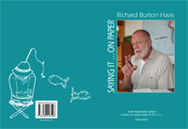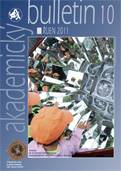
Light the torches, sharpen the axes, bring the ropes; whiches abound. Years ago, Karel Kalinsky told us about witches and witch-hunting in Hammer for the Witches, but he never prepared us for whiches. That's our job today.
Patricia T. O'Conner's delightful book, Woe is I, helps us get started. Select one of these two sentences: "Nobody likes a dog that bites." or "Nobody likes a dog which bites." "If they both sound right," she says, "you've been spooked by whiches." This problem haunts native and foreign speakers alike, but since "which" appears frequently in Czech, and often incorrectly, it's worth lighting our torches so we can see the problem more clearly. By the way, the first sentence, the one with "that bites," was correct.I'll avoid the typical gobbledygook of grammar by using O'Conner's simple explanation. To determine if a clause should start with that or which, I must consider the first of two rules: "If I can drop the clause and not lose the point of the sentence, use which. If I can't, use that." Then, when I have decided, I must remember that "a which clause goes inside commas. A that clause doesn't."
Let's test the distinction between that and which.
Honza's Octavia, which has a broken window, won the race.
The car that won the race was Honza's Octavia.
The point of both sentences is that Honza's Octavia won. In the first sentence, the which clause (which has a broken window) adds extra information, but the information is not necessary to the sentence and can be cut. In the second sentence, the that clause (that won the race) defines the car, and since it defines the subject of the sentence (car), it is necessary and cannot be cut.
Let's test it again:
The river that runs through New Orleans is called the Mississippi.
The Mississippi River, which runs through New Orleans, has inspired great writing.
In the first sentence, the that clause (that runs through New Orleans) defines the subject (river) and cannot be cut from the sentence, and no commas interrupt our reading. In the second sentence, the which clause (which runs through New Orleans) adds information, but since no relationship exists between the river running through the city and inspiring great writing, the which clause is a mere parenthetical remark, and can be cut from the sentence; the commas help the reader know the clause is sentence fat.
This lesson may be hard to swallow, and for understandable reasons. Many people use which where they should use that. We often read it; we hear it everyday. I hear it several times in every class I teach. Which is an essential word in the Czech language. It gets translated directly into English without the speakers noticing the effect it has – in my case, shivers running up my spine, tears running down my cheeks. Native speakers must think nothing is wrong; which sounds professorial and dignified, even eloquent. O'Conner thinks some folks might consider "which more refined or elegant than that. Not so!" she adds. I certainly agree, as do most teachers of English. Note, I said "most."
I recently found a grammar text that raised the white flag of surrender. The author, who will remain anonymous, said which could replace that as long as no commas were used. He must have felt defeated by people who ignored his advice, so he hoisted the flag Idiom Rules. After all, he might have said, what good are rules when people do not follow them? To him, "The car which won the race was Honza's Octavia" would have been correct.
Which and that are signal words; by that, I mean they signal the kind of remark to follow. Which signals an unessential, parenthetical remark, "which won the race" – that signals an essential, defining remark, "that won the race." Speakers and writers can interchange them with no pain; only their listeners and readers suffer. Communication is difficult enough without permitting corrupting influences to confuse already complicated situations. I support the rule of idiom over restrictive and unnecessary rules, such as "never end a sentence with a preposition," or "death to those who split an infinitive." But allowing which, a word that signals a parenthetical remark to replace that, a word that signals a defining and clarify remark is not the rule of idiom. The flag should have read Idiocy Rules.
A student of mine became trapped between habit and rule. She said, "There are things that which I have not told you." I suggested she drop both words from the sentence: "There are things I haven't told you." And there are things I haven't told you, but I think you've heard enough about whiches; any more would interfere with your sleep.
RICHARD HAAS,
Oddělení studia jazyků ÚJČ AV ČR












 English
English
